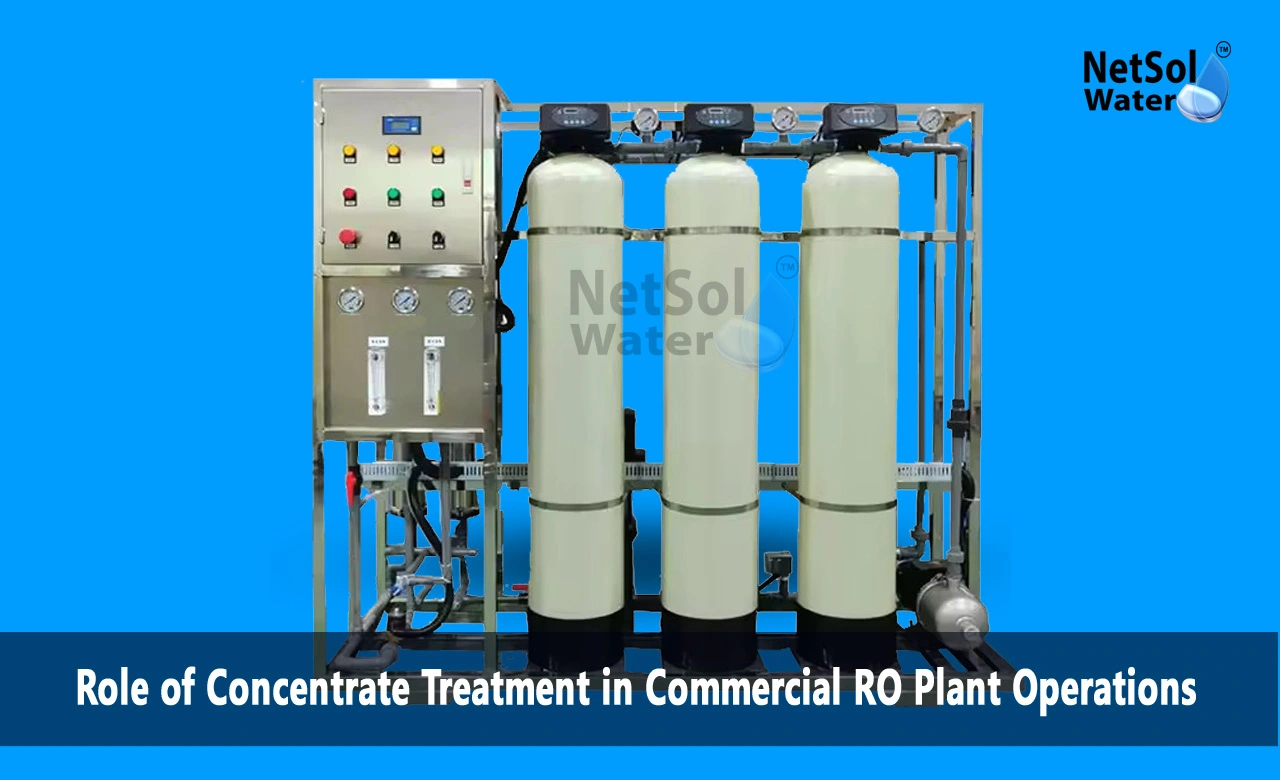Role of Concentrate Treatment in Commercial RO Plant Operations
In today's world, where water scarcity is a pressing global challenge, the use of RO technology has become increasingly widespread in various industries, including municipal water treatment, desalination, and commercial applications. RO plants are highly effective in removing a wide range of contaminants, such as dissolved salts, minerals, and other impurities, from water sources, producing high-quality purified water. However, the process of purification also generates a concentrated waste stream, known as the concentrate or brine, which poses significant environmental and operational challenges if not properly managed.Concentrate treatment plays an important role in ensuring the sustainable and efficient operation of commercial RO plants. We will light on the importance of concentrate treatment and its various aspects, highlighting its crucial contributions to environmental protection, resource conservation, and overall plant optimisation.
Understanding the Concentrate Stream:
The concentrate stream generated by commercial RO plants is a concentrated solution of the contaminants removed from the feed water. It typically contains elevated levels of dissolved solids, minerals, and other impurities, making it unsuitable for direct discharge into the environment or for reuse without proper treatment.The volume and composition of the concentrate stream can vary widely depending on factors such as the feed water quality, the recovery rate of the RO plants, and the specific application or industry. In some cases, the concentrate may also contain potentially harmful substances, such as heavy metals, organic compounds, or microorganisms, further emphasising the need for effective treatment.
Environmental and Regulatory Considerations:
The discharge of untreated concentrate from commercial RO plants into water bodies or the environment can have severe negative impacts, including:
1. Ecological Disturbance: High concentrations of salts, minerals, and other contaminants in the concentrate can disrupt the delicate balance of aquatic ecosystems, affecting marine life and habitats.
2. Water Quality Degradation: The release of concentrate can lead to the deterioration of surface water and groundwater quality, posing risks to human health and agricultural activities.
3. Regulatory Compliance: Strict environmental regulations govern the discharge of industrial and municipal wastewater, including concentrate streams from RO plants. Failure to comply with these regulations can result in hefty fines and legal consequences.
Treatment Techniques for Concentrate Management:
Given the environmental and regulatory concerns, as well as the potential for resource recovery, concentrate treatment has become an essential component of commercial RO plant operations. Several techniques are employed to manage and treat the concentrate stream effectively:
1. Evaporation and Crystallization:
These processes involve the removal of water from the concentrate stream, resulting in the formation of solid salts or crystals. Evaporation can be achieved through various methods, such as thermal evaporation, multi-effect distillation, or membrane distillation. Crystallisation, on the other hand, involves the controlled precipitation and recovery of solid salts, which can be further processed or disposed of safely.
2. Membrane Concentrate Treatment:
Advanced membrane technologies, such as reverse osmosis (RO) or nanofiltration (NF), can be employed to concentrate the concentrate stream further, reducing its volume and enabling more efficient management. These processes are often coupled with other treatment techniques, such as evaporation or crystallisation, for optimal results.
3. Chemical Precipitation and Ion Exchange:
Chemical precipitation involves the addition of specific reagents to the concentrate stream, promoting the formation of insoluble compounds that can be removed through sedimentation or filtration. Ion exchange resins can also be used to selectively remove specific ions or contaminants from the concentrate, allowing for their recovery or safe disposal.
4. Concentrate Reuse and Resource Recovery:
In certain industries, the concentrate stream may contain valuable resources that can be recovered and reused. For example, in desalination plants, the concentrate may contain minerals or salts that can be extracted and utilised in various applications, such as fertiliser production or chemical manufacturing. This approach not only reduces the environmental impact but also contributes to resource conservation and circular economy principles.
5. Zero Liquid Discharge (ZLD) Systems:
In cases where discharge is not feasible or permitted, zero liquid discharge (ZLD) systems can be employed. These systems combine various treatment processes, such as evaporation, crystallization, and membrane technologies, to recover water and solids from the concentrate stream, leaving virtually no liquid discharge.
Optimizing RO Plant Operations:
Effective concentrate treatment not only addresses environmental and regulatory concerns but also contributes to the overall optimisation of commercial RO plant operations. By reducing the volume of concentrate and recovering valuable resources, treatment techniques can:
1. Improve Water Recovery Rates: Efficient concentrate management allows for higher water recovery rates from the RO system, increasing the overall water production capacity.
2. Enhance Energy Efficiency: Certain concentrate treatment processes, such as membrane-based techniques or evaporation systems, can be integrated with energy recovery mechanisms, reducing the overall energy consumption of the plant.
3. Extend Membrane Life: Proper concentrate management can help mitigate scaling and fouling issues, which can adversely affect membrane performance and lifespan.
4. Reduce Disposal Costs: By minimising the volume of concentrate or enabling resource recovery, concentrate treatment can significantly reduce the costs associated with disposal or transportation.
Conclusion:
In commercial RO plant operations, concentrate treatment plays a crucial role in ensuring environmental sustainability, regulatory compliance, and operational efficiency. By addressing the challenges posed by the concentrated waste stream, concentrate treatment techniques not only mitigate environmental impacts but also contribute to resource conservation, water recovery optimisation, and overall plant performance.As water scarcity continues to be a global concern, the importance of concentrate treatment in RO plants will only continue to grow. Ongoing research and technological advancements in this field will further enhance the effectiveness and economic viability of concentrate management strategies, paving the way for more sustainable and efficient water treatment solutions.
To explore customised commercial RO plants, Industrial RO plants, ETP or STP solutions for your needs in your areas and nearby regions, contact Netsol Water at:
Phone: +91-965-060-8473, Email: enquiry@netsolwater.com



